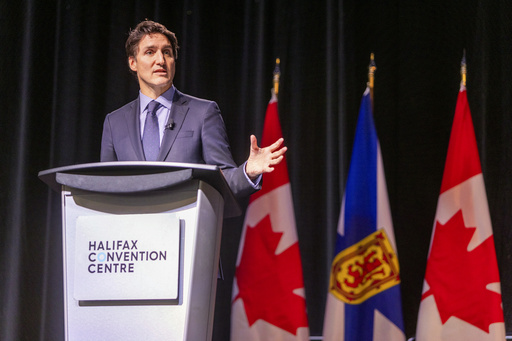TORONTO — Canadian Prime Minister Justin Trudeau expressed concerns on Monday about the potential economic impact of U.S. tariffs, stating that if implemented, these tariffs could significantly raise prices for American consumers. He warned that he would take action if President Donald Trump follows through with his proposed measures.
In a speech at the Halifax Chamber of Commerce event, Trudeau remarked that engaging with Trump may prove to be more complex this time, as Trump’s team appears to have a clearer agenda right from the start, in contrast to the previous approach taken after his 2016 electoral victory. Trump has suggested imposing a hefty 25% tax on products from Canada and Mexico unless these nations curb immigration and drug trafficking.
“The reality is now becoming more apparent to individuals in the U.S. that tariffs on a broad range of goods from Canada would lead to increased costs,” Trudeau stated. Over the weekend, during an interview on NBC’s “Meet the Press,” Trump acknowledged that he cannot assure that the introduction of tariffs would not lead to higher prices for American consumers.
Trudeau emphasized the severe repercussions such tariffs would have, commenting, “A 25% tariff could be catastrophic for the Canadian economy and would compromise the financial well-being of many Americans as well.” He pointed out that a large portion of the crude oil, electricity, and natural gas consumed in the U.S. is sourced from Canada, and any tariffs would introduce notable price hikes on these essential imports.
In a social media post late Monday, Trump seemed to respond to Trudeau’s remarks, referring to the Canadian Prime Minister as the “Governor of the Great State of Canada.” This comment followed Trudeau’s recent dinner at Trump’s Mar-a-Lago resort, where discussions included the implications of tariffs and trade relations.
If Trump enacts these tariffs, they could conflict with his promises to alleviate inflation for American families. Economists predict that businesses would likely transfer the higher costs from tariffs onto consumers, leading to increased prices for everyday items like food, clothing, and vehicles. The Produce Distributors Association warned that such tariffs would elevate the cost of fresh produce and negatively impact U.S. farmers amid potential retaliatory measures from Canada.
Trudeau noted that his administration is preparing to respond appropriately to unfair tariffs, recalling how Canada implemented billions in duties in 2018 as a counteraction to new U.S. tariffs on Canadian steel and aluminum products. Many of these U.S. imports targeted by Canada during that time were strategically chosen for their political rather than economic significance, highlighting some niche products that were of particular interest to the U.S. legislators.
While discussing the potential fallout, Trudeau emphasized the importance of remaining composed and strategic in their response to avoid creating additional confusion. He underscored the necessity of presenting a united front rather than amplifying Trump’s narrative that casts Canada alongside Mexico in terms of their trade dynamics.
Additionally, Canadian officials have contested Trump’s assertions regarding drug trafficking, presenting statistics that indicate a vastly lesser amount of fentanyl smuggled into the U.S. from Canada compared to Mexico. In a context where U.S. border authorities reported over a million encounters with unauthorized migrants at the southern border, the Canadian border saw only a fraction of such incidents.
Trump has also suggested that the U.S. supports Canada financially to an excessive degree, claiming over $100 billion annually. However, Canada’s ambassador to the U.S., Kirsten Hillman, pointed out that while the U.S. had a $75 billion trade deficit with Canada last year, a substantial portion was attributed to energy exports, particularly given the current high prices of oil.
Canada is a crucial source of various commodities for the U.S., being the largest supplier of steel, aluminum, and uranium while also possessing critical minerals vital for American national security interests. Daily, nearly $3.6 billion Canadian (about US$2.7 billion) worth of goods and services flow between the two countries, with Canada being the primary export market for 36 U.S. states.


